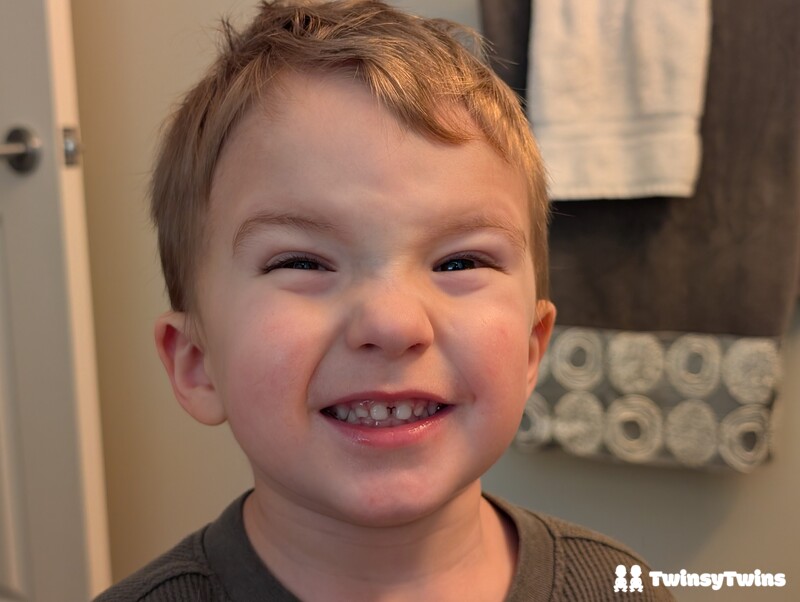
Are you one of those people who takes pristine care of their pearly whites? Or are you one of those people who frantically flosses the morning before your dental check-up?
Whichever camp you're in, it falls on you to help your little ones learn how to take good care of their teeth, including when they should learn about flossing.
Introduce oral hygiene practices at an early age

You should start flossing your toddlers' teeth once two of their teeth are touching (this usually happens when they're somewhere around two or three years old) or when you notice food gets stuck between their teeth.
It's important to floss your twins' teeth at this point because when their teeth are close enough that they're touching, it means their toothbrush can't remove the plaque that can build up between them.
Note, just like brushing their teeth, don't let your toddlers floss their own teeth, as they don't yet have the dexterity to do it properly or effectively themselves (this usually doesn't click until closer to age six or eight, when they're able to successfully tie their own shoes).
How to floss your children's teeth

When you're a toddler, it can be hard to see if you have any food stuck between your teeth, so it's a good idea to get some help (from an adult) when it's time to floss.
Though, having a twin helper to inspect your mouth can keep things interesting. I can't tell you how many times my twins have told me to open my mouth so they could see my uvula. It keeps them intrigued and wanting to learn about oral health, so I don't mind.
According to Colgate, here's how to floss your children's teeth in four easy steps:
- Dispense about 45 centimeters of floss.
- Wind the floss around your thumb and index finger at each end, until you have a short section of floss between your fingers to use. Gently slide the section of floss between your child's teeth.
- Adjust the floss into a 'C' shape curve around each tooth and slide it up and down gently along the side of the tooth and under the gum line.
- Use a fresh section of floss for each tooth to avoid reinserting food and biofilm.
Keep those pearly whites pristine

If you make flossing a part of your toddlers' daily brushing routine, it can help them establish good oral hygiene habits from an early age.
And remember, your kids are always watching what you their parents do. If you make a habit of brushing and flossing your own teeth in front of them at the same time each day and talk about the importance of keeping your teeth clean, it'll teach your toddlers that brushing and flossing are an integral part of starting and ending your day (flossing doesn't need to be done twice daily; just once after your evening meal is fine to get them into the habit of flossing every day).
If your twins aren't loving the idea of learning how to floss, try a different angle. See if they'll help you find monsters hiding between their teeth. Monsters make everything more fun (except when they're hiding under the bed).
When did you introduce your twins to flossing? Were they excited to learn about it? Let us know in the Comments section below or connect with us on Instagram to share your thoughts!
Read more

Brushing Teeth Just Became a Breeze with This Smart Toothbrush for Kids
Oral health is so important, and forming good dental hygiene habits at an early age can give children a solid foundation for a lifetime of smiles. But, sometimes, getting your twins to brush their teeth can be like, well, pulling teeth. Not anymore. This smart toothbrush for kids, in a crowning achievement, just put a cap on the struggles that come with taking good care of our teeth...

What a Mess: How to Get Vaseline Out of Your Mischievous Toddler’s Hair
You never think it's going to happen to you—until it does. You're going about your day, doing an excellent job of keeping your twin toddlers alive and, hopefully, thriving, and you're pretty impressed with how things are going. At minimum, they're fed and as happy as any independent-but-not-yet-independent toddlers can be. And because they're playing, either independently or...

Give New Meaning to Drawing a Bath with These Water-Tinting Tablets
Sometimes, kids love hopping into the tub. Other times, they'd rather do anything else. And when you need to get two toddlers excited about bath time at the same time, it can be tricky. When you run into those tricky times, there's a quick and easy way to get your twins on board with bath time. Ask them what color they want the water to be, and watch them jump up and head toward the...

Eczema Relief for Premature Infants: 3 Simple Tips Every Parent Should Know
Premature babies are more prone to experiencing health and immunity complications. Every baby who is born early can face different difficulties, ranging from jaundice or anemia, to issues with breathing and respiration, to trouble with temperature regulation, to problems with hearing or vision, to developmental delays or learning disabilities, and more. Some of the lesser-known issues...